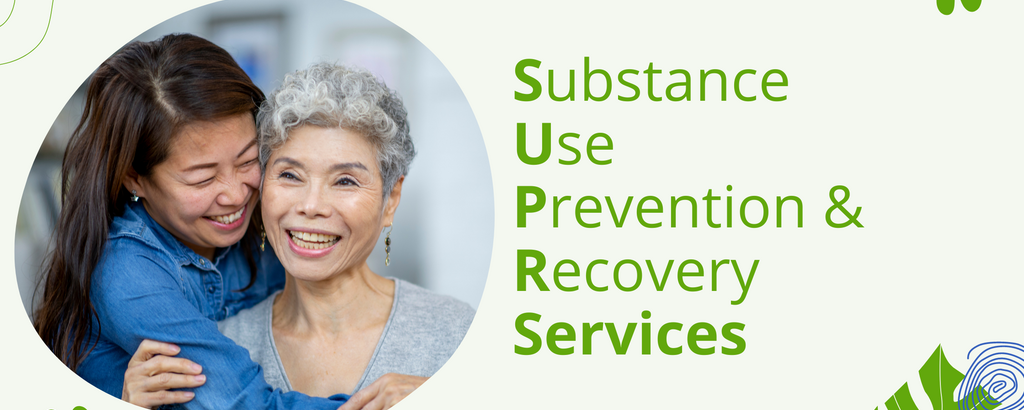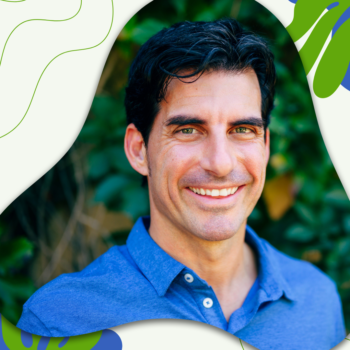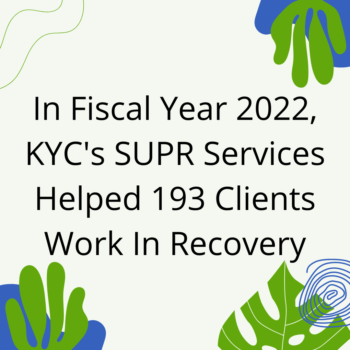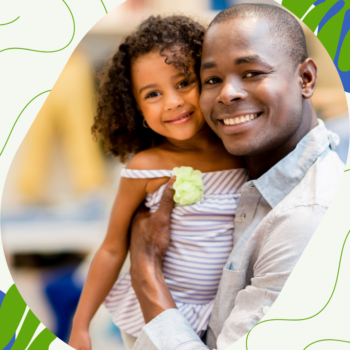
National Recovery Month Program Spotlight: SUPR Services
Since 1989, September has been recognized as National Recovery Month, a time to celebrate and honor the accomplishments of people in recovery for substance use and mental health challenges. It’s also a time to spread awareness of recovery resources, treatment practices, and service providers who guide folks through their recovery journey.
“To me, Recovery Month means educating and providing awareness about substance use and mental health treatment, as well as how services can help community members live a healthy and well-balanced life,” shares KYC’s Manager of SUPR (Substance Use Prevention and Recovery) Services, Danielle K., LCPC, CADC.
The ongoing theme for Recovery Month is “Every Person. Every Family. Every Community.”. KYC’s SUPR services embody this idea all year-round, helping people of all walks of life achieve their goals.
About SUPR (Substance Use Prevention and Recovery) Services

SUPR services provide evidence-based clinical treatment interventions to help people living with a wide range of substance use disorders.
“Many clients come in with what they understand to be a substance use disorder, and we work together with them to establish exactly what needs to be worked on from that point on,” shares Danielle. “That could include connecting them with stable housing, establishing a proper mental health diagnosis, and connecting them with community-based supports.”
SUPR clinicians provide individual counseling and group sessions that focus on psychoeducation to build skills and understanding to address substance use behaviors.
This includes learning how clients can reduce harm from substance use and building healthy habits that support their individual needs. For instance, clients are trained in how to use NARCAN to prevent opioid overdose. They’re educated on their rights and on Good Samaritan laws, encouraging individuals to call for emergency services in the case of an overdose with an understanding that medical assistance will be the priority, rather than substance confiscation and arrest. Learning this information can be key to preventing death or serious harm from an overdose and ensures safer outcomes for people who use substances.
Harm Reduction Treatment Guided by Personalized Goals

SUPR services follow a harm reduction model. “Harm reduction is about meeting clients where they are — treating them with dignity, compassion, and respect.”
Clients do not need to commit to an abstinence-only course of treatment. Following a harm reduction model, clients can define their own goals and their own language for what success looks like for them. The over-arching goal is to reduce the risk of overdose and harm from substance use behaviors but does not require sobriety.
“In abstinence-based treatment models, if you use the substance again, you have to start over from day one or you could be kicked out of the program altogether,” Danielle explains. “A harm-reduction model is much more open, it’s about meeting the client where they are at.”
This model affords people who are not ready to stop using substances an opportunity to begin their recovery journey at the point that’s right for them. By identifying the goals they have in that moment, they can begin working toward them in a supportive, non-judgmental space.
“Depending on the individual’s goals, we might start just by providing psychoeducation, or examining the safest way possible to use their drug of choice,” Danielle mentions, “so we may provide linkage to needle exchanges, we might share information about safer sex, proper dental hygiene, or even skin care suggestions for people who may have skin challenges related to substance use.”
Empowering Clients

At every turn, the client is empowered to define their own goals, and to create the path that fits them in their stage of living. Danielle continues, “We provide a nondiscriminatory environment, where we can openly discuss the challenges they’ve faced in the past, and even to discuss the biases they may hold toward themselves.”
“Many clients have been stigmatized by every community to which they belong, they’ve been told what they need to do, where they need to go, and what they have to do at all times if they’ve been through the court system,” Danielle notes, “it’s our responsibility as providers to acknowledge that, process it with clients, and work side by side to challenge these biases and guide the client in examining what they envision for recovery.”
Helping a Whole Person Thrive

No person is defined by a singular aspect of their behavior. KYC’s SUPR team works not only to help individuals address substance use behaviors, but to connect them with the wrap-around supports that help them thrive overall. Beyond connecting only with our SUPR team of mental health professionals, clients are provided a link to individual therapists from our outpatient behavioral health teams. Additionally, they may join one of KYC’s peer-led SMART Recovery groups to gain additional insight and learn from others who face similar challenges. Individuals seeking support may connect with our community-based behavioral health teams, gaining additional encouragement as they navigate living in recovery in their own homes and neighborhoods. Clients may also take part in our Behavioral Support programs to apply the skills they learn to their roles as parents and participate in structured opportunities to use their skills in real-world scenarios.
Recovery can impact every aspect of life, from housing, to employment, to physical and mental health. KYC’s SUPR team is not only well-versed in the suite of services that Kenneth Young Center can offer, but they thoughtfully connect clients with the additional community resources they need to live their best lives. Our team of caring professionals works hard to understand the complex needs of the people we serve and continually do what they can to help clients connect to the support they need to truly thrive in recovery.
Connect with Recovery Resources

To learn more about KYC’s SUPR services, please call us at 847−524−8800 ext. 136. Our team will be happy to discuss your situation and the support you’re seeking, and to answer any questions you may have about our programs.
In addition to SUPR services, KYC offers a suite of recovery support to help community members thrive. Learn more below or by calling our team at 847−524−8800 ext. 136.
SMART Recovery
SMART Recovery is a peer-led, non-clinical program for participants to achieve healthy, positive, and balanced lifestyles while navigating substance use and addictive behaviors.
Outpatient Therapy
KYC offers personalized individual, couple, group, and family counseling to people who are working toward their mental health goals. More than 4,000 youth and adults receive outpatient therapy support from KYC each year.
Drop-In Center
Our Drop-In Center is a social setting for adults living with mental health diagnoses to find community and support daily. Click here to learn more and to view the current Drop-In Center activities!
Community-Based Support Programs
We provide a range of intensive community-based behavioral health recovery services to support clients as they develop independent living skills.
Employment Services
Through our partnership with the Illinois Division of Rehabilitation Services, we offer employment services to help people with mental health diagnoses and disabilities find and keep employment.
Psychosocial Rehabilitation
PSR (Psychosocial Rehabilitation) helps adults living with severe and chronic mental illness work toward recovery by practicing skills to live, work, learn, and participate fully in the community.
Previous Article Next Article

